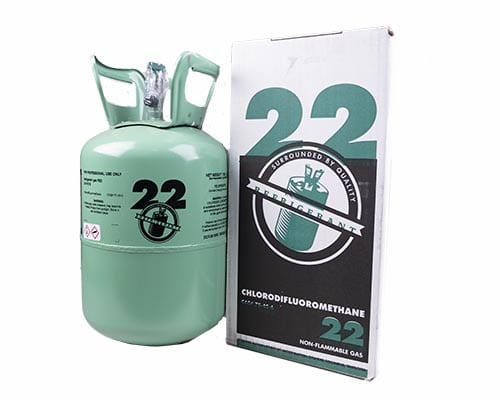New Refrigerants: What They Mean for You
Refrigerant . . . gas . . . freon . . . whatever you want to call it, it’s the life blood of your air conditioner, and most people don’t give it much thought until that air conditioner suddenly doesn’t have as much as it ought. As we head into the 2024 cooling season, now is the time when homeowners may be made aware of their system’s refrigerant issues and told a lot of things about that- some true, some exaggerated, and some flat-out lies. What we here at Bailey’s Air Heroes want to do is make sure you have all the information necessary to make informed decisions and avoid being scammed.

Is My Refrigerant Banned?
There are many different types of refrigerants on the market, designed with different properties to suit particular applications (cars! refrigerators! residential homes! large-scale commercial operations!). A factor that’s been taken into consideration in these last few decades is the question of their impact on the environment, and that has led to national regulations put in place to discontinue the use of refrigerants now considered unfavorable.
So what does that mean for you and your A/C? It can depend. There are still some units (let’s call ’em vintage!) out there just chugging along, still using refrigerant that’s now no longer able to be manufactured in, nor imported into, the U.S.. And even so, this refrigerant (R-22), is still available for purchase, given that it must be collected and disposed of properly from junked equipment, and can therefore be recycled and cleaned for re-sale. This pool of available R-22 will dwindle over time, and it’s for each contractor to decide for themselves when it stops becoming sensible to continue to offer and carry (on space-constrained trucks) refrigerant that is simultaneously becoming more expensive (supply and demand, after all) and less often encountered in homes. But continued sale of recyled R-22, along with the existence of cheaper substitute alternative blends that have similar properties and will therefore work (not perfectly, but acceptably) in place of R-22, means that you’re never required to change out your equipment. And indeed, in the past, we’ve heard of more than a few contractors who would rather push words like “banned” or even “illegal” and gloss over the fine details of the options available for customers with outdated refrigerant.
That said, just beause you’re never required to change out your equipment, doesn’t mean that you shouldn’t. Here are some considerations should you keep in mind if a refrigerant issue has led to a replacement recommendation:
- A piece of equipment that uses outdated refrigerant is guaranteed to be of a certain age, and that means that most, if not all, of its other components are also at or exceeding their life expectancy, with decades of wear and tear.
- In the case of refrigerant leaks, the discovery of one likely signals that more are currently microscopic and growing larger over time, or that other new leaks will continue to develop in the aging pipes and welds that have failed.
- Ofentimes, equipment components overheat as they run with inadequate refrigerant, leading to premature failure even after a refrigerant leak has been identified and repaired.
- “Leak sealant” substances advertised on the market may gum up- for lack of a better word- other components within the refrigeration circuit like the compressor and lead to its premature failure.
- Parts required for non-leak-related refrigerant repairs (TXV, compressor, etc.) might be less stocked by distributors in their obsolete refrigerant versions and take longer to bring in to local supply houses.
- Converting equipment to a refrigerant substitue as part of a leak repair can be costly because all the refrigerant has to be removed and replaced, and must also be well and clearly documented for future technicians or risk misdiagnosis and contamination by way of mixing refrigerants.
- Older equipment guzzles energy enormously in comparison to even today’s required minimum-efficiency equipment.
All of these factors, combined with the question of which contractors will sell and carry the particular recycled or substitute you may need and how it will be priced based on market factors, means that a refrigerant repair may be at best a last-ditch effort to get through the season before biting the bullet on a new system, and at worst, throwing good money after bad.

But Will My Refrigerant Be Banned?
So R-22 has gone the way of the dodo- but what about its successor, R-410A? The sad truth is that the refrigerant chosen to take R-22’s place is already on the same path to becoming obsolete. In 2020, the American Innovation and Manufacturing (AIM) Act was enacted into law; combined with the EPA’s new 2025 requirements, this means that next year, new equipment will no longer be made to work with R-410A refrigerant, either.
However, much like with R-22’s slow and gradual phase-out, R-410A refrigerant will continue to be available despite the planned dates for ceasing its manufacture and import. Even way down the line when the existing supply of recycled R-410A is dwindling, new drop-in substitues will be on the market to supplement demand. Furthermore, manufacturers’ and distributors’ remaining inventory of R-410A will be allowed to be sold for a period of time beyond 2025, which means that the hung-over salesman at an estimate on January 1st, 2025 is far more likely to give a quote for an R-410A system than equipment utilizing the new refrigerants. (It takes time, after all, to produce and ship out the new equipment, the old must be liquidated to make room for the new, and distributors will prioritize doing that so as to not be left with unsellable stock once sale of R-410A equipment is disallowed).
Hearing about these industry changes can be a little daunting, but the fact of the matter is that your refrigerant isn’t going to be banned, and that shouldn’t factor into your decisions. If your system is a good candidate for replacement now, there’s no need to hold off and wait for new non-R-410A equipment, and there’s conversely no need to rush to try to get a fine, working system replaced by this Christmas, either. As always, being proactive and planning ahead are key, regular maintenance with licensed professionals will help extend your system’s life and catch small problems before they become big ones, and equipment prices only ever seem to go up, not down.


Leave a Reply
Want to join the discussion?Feel free to contribute!